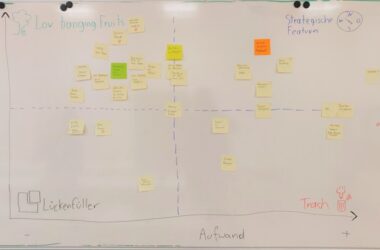As a startup founder, I’ve come to realize that project management is not just a buzzword; it’s the backbone of any successful venture. When you’re juggling multiple tasks, deadlines, and team dynamics, having a solid project management framework can mean the difference between chaos and clarity. It’s about creating a structured approach that allows you to allocate resources effectively, track progress, and ensure that everyone is on the same page.
In the fast-paced world of startups, where time and resources are often limited, maximizing efficiency through project management is crucial. Effective project management helps streamline processes, reduce waste, and enhance productivity. It allows you to set clear goals and objectives, which in turn helps your team understand their roles and responsibilities.
When everyone knows what they need to do and by when, it fosters a sense of accountability and ownership. This clarity not only boosts morale but also drives results. In my experience, when I’ve implemented strong project management practices, I’ve seen my team become more engaged and focused, ultimately leading to better outcomes for our projects.
Key Takeaways
- Project management is crucial for maximizing efficiency in any organization
- Effective communication is key to successful project management and efficiency
- Utilizing technology and tools can streamline project management processes and improve efficiency
- Team management plays a significant role in determining project efficiency
- Continuous improvement and adaptation are essential for long-term efficiency in project management
Key Project Management Strategies for Maximizing Efficiency
Divide and Conquer
Breaking down projects into smaller, manageable tasks makes the workload feel less daunting and allows for easier tracking of progress.
Set Goals and Priorities
By setting milestones and deadlines for each task, I can keep the momentum going and ensure that we’re moving in the right direction. Prioritization has proven invaluable in the startup world, where it’s easy to get overwhelmed by the sheer volume of tasks at hand.
Focus on What Matters
By identifying which tasks are most critical to the project’s success and focusing on those first, I can allocate resources more effectively. This doesn’t mean ignoring less critical tasks; rather, it’s about ensuring that the most impactful work gets done first. Additionally, utilizing tools like the Eisenhower Matrix can help in distinguishing between what’s urgent and what’s important, allowing for better decision-making.
The Role of Communication in Project Management for Efficiency
Communication is the lifeblood of any project management effort. Without clear and open lines of communication, even the best-laid plans can fall apart. I’ve learned that fostering a culture of transparency within my team is essential for maximizing efficiency.
Regular check-ins and updates help keep everyone informed about project status and any potential roadblocks.
Moreover, leveraging various communication tools can enhance efficiency significantly.
Whether it’s using instant messaging platforms for quick questions or project management software for detailed updates, having the right tools in place can streamline communication. I’ve found that establishing a communication protocol—defining when to use which tool—can help reduce confusion and ensure that everyone is aligned. Ultimately, effective communication leads to better teamwork, which is crucial for driving projects forward.
Utilizing Technology and Tools for Efficient Project Management
| Technology/Tool | Benefits | Usage |
|---|---|---|
| Project Management Software | Centralized project data, task tracking, collaboration | Used by 87% of project managers |
| Cloud Storage | Easy access to project files, data security | Adopted by 65% of project teams |
| Communication Tools | Real-time messaging, video conferencing | Integrated into 92% of project management processes |
| Task Management Apps | Efficient task allocation, progress tracking | Utilized by 78% of project teams |
In today’s digital age, technology plays a pivotal role in project management efficiency. There are countless tools available that can help streamline processes, track progress, and facilitate collaboration among team members. For instance, project management software like Trello or Asana allows me to visualize tasks and deadlines easily.
These platforms enable me to assign tasks to team members, set due dates, and monitor progress in real-time. Additionally, utilizing cloud-based storage solutions like Google Drive or Dropbox ensures that all team members have access to the latest documents and resources. This eliminates the confusion that often arises from version control issues and allows for seamless collaboration.
I’ve also found that integrating tools like Slack for communication with project management software creates a cohesive workflow where updates and discussions happen in one place. Embracing technology not only enhances efficiency but also empowers my team to work smarter.
The Impact of Team Management on Project Efficiency
Team management is another critical aspect of maximizing project efficiency. As a founder, I’ve learned that building a strong team dynamic is essential for success. This involves not only hiring the right people but also fostering an environment where everyone feels valued and motivated to contribute their best work.
When team members are engaged and aligned with the project’s goals, they are more likely to go above and beyond to ensure its success. Moreover, understanding each team member’s strengths and weaknesses allows me to delegate tasks more effectively. By assigning roles based on individual skills and expertise, I can ensure that everyone is working on what they do best.
This not only boosts productivity but also enhances job satisfaction among team members. Regular feedback sessions and recognition of achievements further contribute to a positive team culture, ultimately leading to improved project outcomes.
Time Management and Scheduling in Project Management
Time management is a cornerstone of effective project management. In my experience, creating a realistic schedule that accounts for all tasks and deadlines is crucial for keeping projects on track. I’ve found that using Gantt charts or similar scheduling tools helps visualize timelines and dependencies between tasks.
This allows me to identify potential bottlenecks early on and adjust plans accordingly. Additionally, setting aside dedicated time for focused work can significantly enhance productivity. I encourage my team to block off time on their calendars for deep work sessions where they can concentrate without distractions.
This practice not only helps in meeting deadlines but also fosters a culture of respect for each other’s time. By prioritizing time management within our projects, we can ensure that we’re making steady progress toward our goals.
Risk Management and Contingency Planning for Efficient Project Execution
Every project comes with its own set of risks, and being prepared for potential challenges is essential for maintaining efficiency. I’ve learned that conducting a thorough risk assessment at the beginning of a project can help identify potential pitfalls before they become major issues. By anticipating risks and developing contingency plans, I can ensure that my team is ready to pivot if necessary.
For instance, if we’re working on a product launch and there’s a risk of delays in development, having a backup plan in place allows us to adjust timelines or allocate additional resources as needed. This proactive approach not only minimizes disruptions but also instills confidence within the team that we can handle challenges effectively. Emphasizing risk management as part of our project planning process has proven invaluable in maintaining momentum and achieving our objectives.
Continuous Improvement and Adaptation in Project Management for Long-term Efficiency
Finally, one of the most important aspects of project management is the commitment to continuous improvement. In the ever-evolving landscape of startups, being adaptable is key to long-term success. After each project, I make it a point to conduct a retrospective analysis with my team to evaluate what worked well and what could be improved upon in future projects.
By being open to feedback and willing to make adjustments based on our experiences, we can refine our project management strategies over time. Embracing a mindset of continuous improvement ensures that we’re not just maintaining efficiency but actively seeking ways to enhance it further.
In conclusion, effective project management is essential for maximizing efficiency in any startup environment. By implementing key strategies, fostering open communication, leveraging technology, managing teams effectively, prioritizing time management, preparing for risks, and committing to continuous improvement, we can navigate the complexities of project execution with confidence. As you embark on your own startup journey or seek to enhance your existing projects, consider partnering with Witarist as your trusted tech ally.
Our expertise in MVP development, product ideation, website/app creation, and hiring vetted developers can help you turn your vision into reality while maximizing efficiency every step of the way. Let’s connect today and explore how we can work together to bring your ideas to life!
If you are interested in project management, you may also want to check out this article on 5 Ways to Build Your Professional Online Presence. Building a strong online presence can be crucial for project managers looking to network, showcase their skills, and attract new opportunities. This article offers valuable tips and strategies for establishing and maintaining a professional online presence in the digital age.
FAQs
What is project management?
Project management is the practice of initiating, planning, executing, controlling, and closing the work of a team to achieve specific goals and meet specific success criteria.
What are the key components of project management?
The key components of project management include defining the project scope, creating a project plan, allocating resources, managing the project budget, and monitoring and controlling the project execution.
What are the benefits of project management?
Some of the benefits of project management include improved efficiency, better communication, increased customer satisfaction, higher quality deliverables, and better risk management.
What are the different project management methodologies?
Some of the different project management methodologies include Waterfall, Agile, Scrum, Kanban, Lean, and Six Sigma.
What are the essential skills for a project manager?
Essential skills for a project manager include leadership, communication, time management, problem-solving, and risk management.
What are the common challenges in project management?
Common challenges in project management include scope creep, resource allocation, communication issues, and managing stakeholder expectations.










